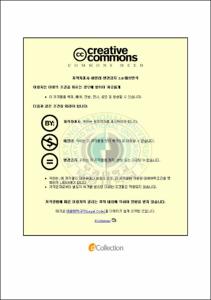경험 귀추적 순환 학습이 중학교 과학수업에 미치는 영향
- Alternative Title
- The Effect of Empirical Abductive Learning Cycle on Middle School Science Instruction : 'Material' Section of Middle School Science1
- Abstract
- The purpose of this study was to develop a model of Empirical Abductive Learning Cycle in 'material' section and to investigate effectiveness on middle school students' attitudes related to science, logical thinking power and science achievement. The 127 students in 7th grade at a middle school in Busan were the subjects in this study. They were randomly assigned to the control group and treatment group. The treatment group received the instruction of Empirical Abductive Learning Cycle. The control group received a text book oriented form of instruction. They have been taught for 12 class periods during the second semester. Evaluation instruments used in pre-test and post-test were attitudes related to science test, logical thinking power test, and science achievement test. And ANCOVA was carried out using SPSS 15.0 statistic program. The results of study were as follows.
Firstly, the adjusted mean of the treatment group was higher than that of the control group by 8.24 and there was significant improvement(ρ< .05) for the treatment group about students' attitudes related to science test by ANCOVA analysis.
Secondly, in both of high and low level groups, the analysis by ANCOVA showed that the adjusted mean of students' attitudes related to science test for the treatment group were significantly higher than those of the control group(ρ< .05).
Thirdly, the adjusted mean of treatment group was higher than that of the control group by 3.315 and there was significant improvement(ρ< .05) for the treatment group about students' logical thinking power test by ANCOVA analysis.
Fourthly, especially in high level group, the analysis by ANCOVA showed that the adjusted mean of students' logical thinking power test for the treatment group was significantly higher than that of control group(ρ< .05). But in low level group, there was no significant improvement(ρ> .05) for the treatment group about students' logical thinking power test by ANCOVA analysis.
Fifthly, especially in operational period thinking level group, the adjusted mean of students' logical thinking power test for the treatment group was not significantly higher than that of control group(ρ> .05). There was significant improvement(ρ< .05) for transitional period-formal operations stage thinking level group.
Sixthly, the adjusted mean of the treatment group was lower than that of control group by 4.825 and there was no significant improvement (ρ> .05) for the treatment group about the students' science achievement test by ANCOVA analysis.
Seventhly, especially in high level group, the analysis by ANCOVA showed that the adjusted mean of students' science achievement test for treatment group was not significantly higher than that of control group(ρ> .05). But in low level group, there was significant improvement (ρ< .05) for the treatment group about students' science achievement test by ANCOVA analysis.
According to the analysis, in high level group, it was found that students of treatment group received the instruction of model of Empirical Abductive Learning Cycle changed positively in attitudes related to science and logical thinking power. However in low level group, it was found that students of control group received a text book oriented form of instruction changed positively in science achievement. Therefore the proper use of the Empirical Abductive Learning Cycle and text book oriented form of instruction can give them better learning effect in a class which students of the two levels coexist.
- Issued Date
- 2008
- Awarded Date
- 2008. 8
- Type
- Dissertation
- Keyword
- 경험 귀추적 순환학습 순환학습 물질
- Publisher
- 부경대학교 교육대학원
- Alternative Author(s)
- Kim, Hee Won
- Affiliation
- 부경대학교 교육대학원
- Department
- 교육대학원 화학교육전공
- Table Of Contents
- Abstract = vii
I. 서론 = 1
1. 연구의 필요성과 목적 = 1
2. 연구 문제 = 3
3. 연구의 제한점 = 4
II. 이론적 배경 = 6
1. 피아제(Piaget)의 인지발달이론 = 6
2. 로손(Lawson)의 순환 학습 = 9
3. 경험 귀추적 순환 학습 = 15
III. 연구 절차 및 방법 = 19
1. 연구 대상 = 19
2. 연구 방법 = 19
3. 검사 도구 = 21
가. 과학에 관련된 태도 측정 도구 = 21
나. 논리적 사고력 측정 도구 = 23
다. 학업 성취도 측정 도구 = 24
4. 연구 절차 = 24
5. 선행 연구 분석 = 26
가. 국내 = 26
나. 국외 = 28
6. 사전검사 = 29
7. 중학교 1학년 「물질」단원의 내용 분석 및 교수 학습 목표 선정 = 30
8. 수업 처치 = 33
9. 사후검사 = 36
10. 검사 결과의 분석 = 36
IV. 연구 결과 및 논의 = 38
1. 과학에 관련된 태도에 관한 효과 = 38
가. 실험집단과 통제집단의 전체 학생들의 과학에 관련된 태도 비교 분석 = 38
나. 실험집단과 통제집단의 수준별 과학에 관련된 태도 비교 분석 = 40
2. 논리적 사고력에 대한 효과 = 43
가. 실험집단과 통제집단의 전체 학생들의 논리적 사고력 비교 분석 = 43
나. 실험집단과 통제집단의 수준별 논리적 사고력 비교 분석 = 44
다. 실험집단과 통제집단의 인지 수준별 논리적 사고력 비교 분석 = 47
3. 학업 성취도에 대한 효과 = 50
가. 실험집단과 통제집단의 전체 학생들의 학업 성취도 비교 분석 = 50
나. 실험집단과 통제집단의 수준별 학업 성취도 비교 분석 = 52
V. 결론 및 제언 = 55
참고문헌 = 58
- Degree
- Master
- Files in This Item:
-
-
Download
 경험 귀추적 순환 학습이 중학교 과학수업에 미치는 영향.pdf
기타 데이터 / 2.74 MB / Adobe PDF
경험 귀추적 순환 학습이 중학교 과학수업에 미치는 영향.pdf
기타 데이터 / 2.74 MB / Adobe PDF
-
Items in Repository are protected by copyright, with all rights reserved, unless otherwise indicated.